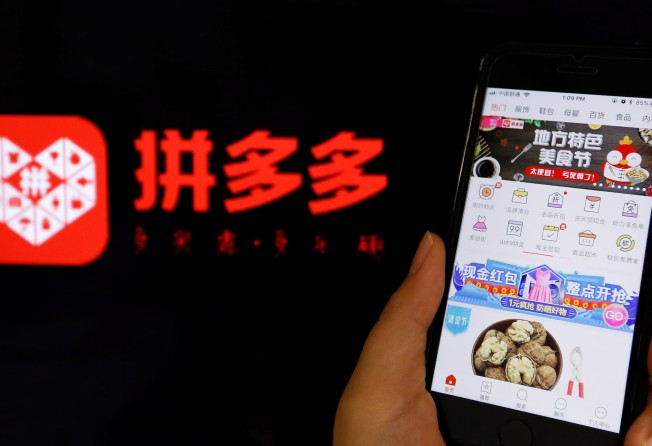Pinduoduo stock soars 19 per cent as it aligns with genuine brands to clean up counterfeit image

Pinduoduo, the social commerce company which became China’s No. 3 e-commerce firm within three years, is addressing the perception that it hawks cheap and counterfeit products by aligning itself with legitimate brands and bringing more attention to brands’ flagship stores.
The company’s Nasdaq-listed stock soared 19.4 per cent to close at US$23.57 on Tuesday, the highest jump since its debut, after Pinduoduo rolled out recent updates that include highlighting products by brand. The Shanghai-based company renamed a homepage segment called “Discounts on Branded Goods” to “Branded Goods Pavilion”, featuring a list of 494 brands with “flagship stores” on the platform.
The brands include NetEase’s Yanxuan platform, which sells Yanxuan-branded goods that Pinduoduo claims to be both good quality and value-for-money. The brand’s minimalist, Muji-like aesthetic on everything from Japanese cotton bedsheets to utensils and clothing have gained it legions of fans in China and helped NetEase rake in 4.4 billion yuan (US$640 million) in e-commerce revenue for the quarter ended June 30. William Ding Lei, chief executive of NetEase, is also an early investor in Pinduoduo.
Other brands with flagship stores on Pinduoduo include Walch, Yamaha and Chow Tai Fook.
A Pinduoduo spokesman said that the company is “improving services constantly” when asked about the recent update.
The move to clean up its image comes after a spate of negative press reports just days after it listed on Nasdaq in July. Media and consumers alike criticised Pinduoduo for allowing counterfeit and inferior products on its platform, and its stock price, which had surged from its initial offering price of US$19 to US$26.70 on the first day of trading, rapidly declined. It fell to an all-time low on August 24, closing at US$17.22.
In the seven weeks since Pinduoduo’s listing, which made founder and chief executive Colin Huang Zheng China’s ninth-richest person with a net worth of US$12.2 billion, the company has been investigated by regulators, slapped with class-action lawsuits that accused it of misleading investors in its prospectus, and received demands by brands to remove knock-off listings on its site.
The company has since expressed contrition, pledging to install a better monitoring mechanism to fight fakes and promised to work with merchants to encourage them to sell legitimate products instead of knock-offs.
“I would like to … reiterate that we have and will always have zero tolerance for counterfeit products,” Huang said in an earnings call with analysts and media last month. “[Pinduoduo is] the first and one of the few platforms in China that have insisted on a 10-times penalty on counterfeit products and we will not compromise on it. We still have a lot to do to eliminate infringement offences on our platform.”
The company, which said it aspires to be a combination of Disney and Costco, reported a net loss of US$6.5 billion yuan in its maiden results as it spent massively on marketing expenses to maintain rapid user growth.